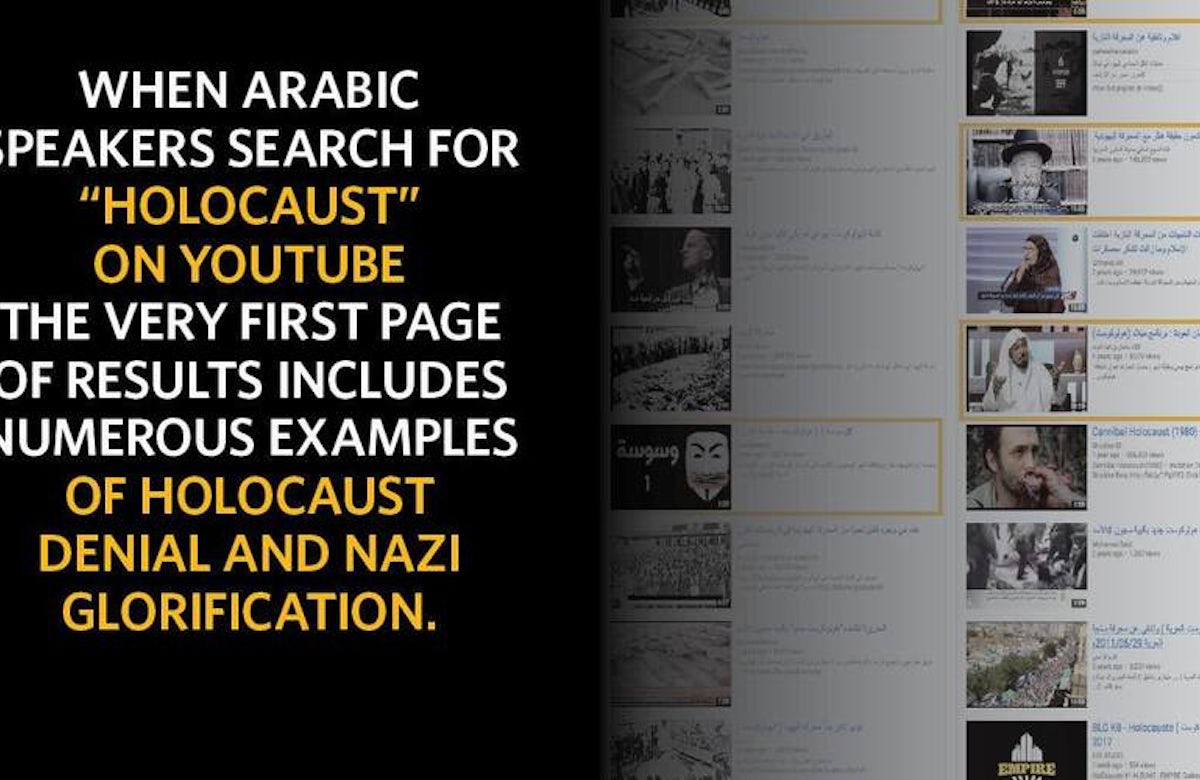NEW YORK – The World Jewish Congress recently launched a campaign to expose and remove Arabic-language anti-Semitic content on social media platforms, beginning with YouTube, and has already met with some early success.
The WJC compiled a precise list of the most prevalent materials that appeared on YouTube using the search term “Holocaust” in Arabic, finding pages of Nazi glorification, Holocaust denial, and blatantly anti-Semitic content. The WJC brought the matter to the attention of YouTube’s director of public policy, and expressed its concerns. Within a few days, YouTube informed the WJC that every piece of anti-Semitic content it had flagged had been removed. 
But the WJC campaign is just beginning. There are still hundreds if not thousands of pieces of anti-Semitic content in Arabic on social media platforms, and their removal depends on the assistance of individuals and organizations in searching for and flagging the offensive material.
The WJC will continue its research to provide qualitative data about Arabic-language anti-Semitism on social media platforms, by analyzing Facebook, Twitter, Google, YouTube and Instagram, in accordance with four different types of anti-Semitic content – Holocaust denial, Nazi glorification, dehumanization of Jews, and incitement to violence against Jews. The WJC will also analyze the demonization of Israel online and will look at calls in Arabic on social media to destroy Israel. When completed, the comprehensive research will be released to the public.
In April, the WJC published a survey, conducted by the Israeli monitoring firm Vigo Social Intelligence, on the prevalence of anti-Semitism on social media. The WJC research analyzed tens of millions of posts in 20 languages on Facebook, Twitter, YouTube, Instagram, blogs and other forums. Among the worrying figures, the WJC found that more than 382,000 anti-Semitic posts were posted to social media platforms over the course of 2016 – an average of more than 43.6 posts per hour, or one post every 83 seconds. It also determined that an overwhelming 63 percent of all anti-Semitic content online can be found on Twitter.
The criteria used to determine whether a post was anti-Semitic was based on International Holocaust Remembrance Alliance (IHRA)’s May 2016 definition that “anti-Semitism is a certain perception of Jews, which may be expressed as hatred toward Jews. Rhetorical and physical manifestations of anti-Semitism are directed toward Jewish or non-Jewish individuals and/or their property, toward Jewish community institutions and religious facilities.” The IHRA’s full definition of anti-Semitism can be found here.
“We knew that anti-Semitism online was on the rise, but the numbers revealed in this report give us concrete data as to how alarming the situation really is,” World Jewish Congress CEO and Executive Vice President Robert R. Singer said upon release of the findings. “We hope this serves as a wake-up call to all internet forums to maintain moral standards, rid themselves of offensive content, and make the digital world a safer place for all.”






